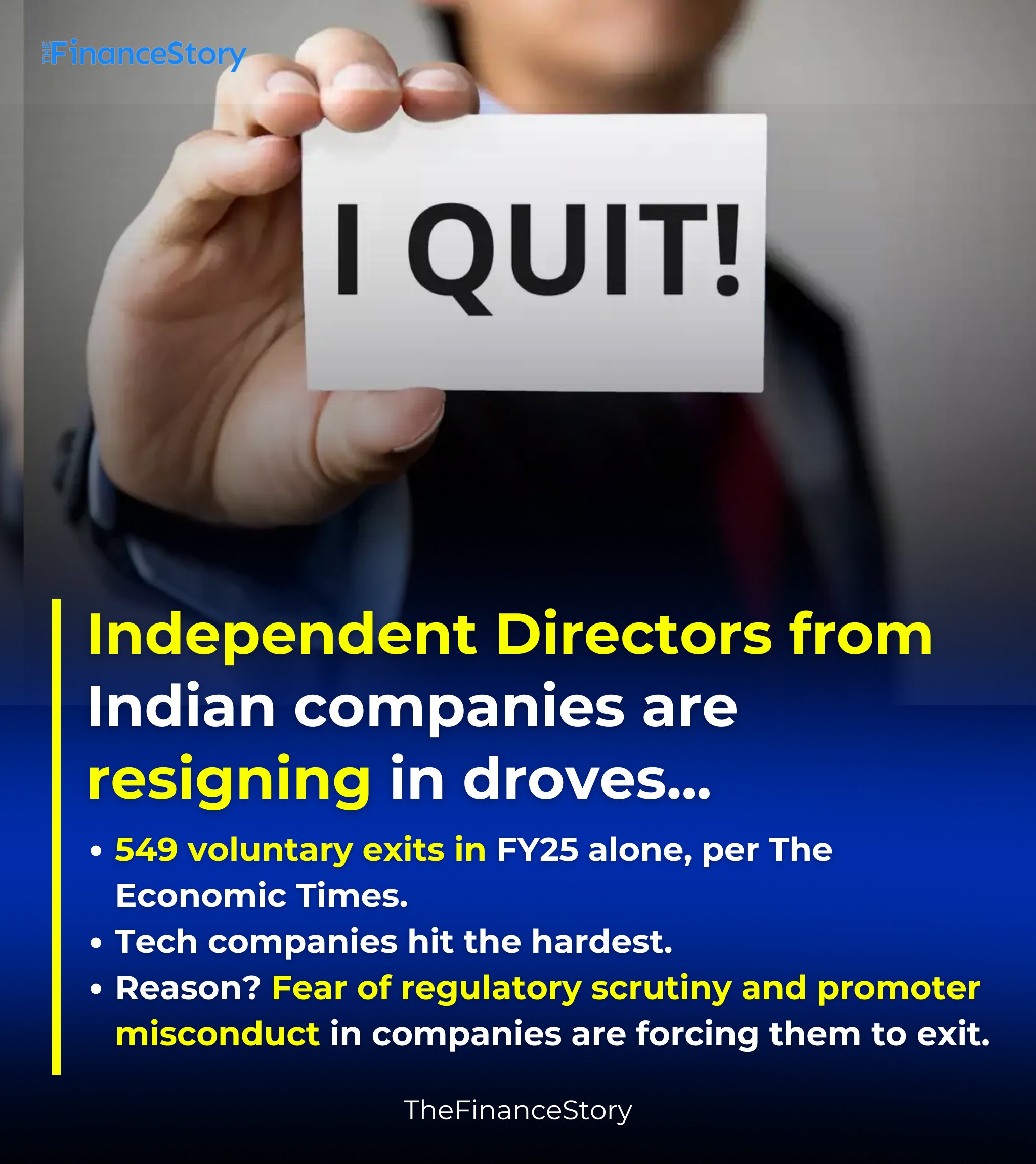- Independent Directors from Indian companies are resigning in droves…with tech companies hit the hardest!
- 549 Independent Directors quit in FY25 alone, per The Economic Times.
- Reason? Fear of regulatory scrutiny and promoter misconduct in companies are forcing them to exit.

What’s brewing in Indian boardrooms?
The primary differences between Executive and Independent Directors are:
- Executive Director: Involved in the day-to-day management and operations of the company.
- Independent Director: Not involved in daily operations; provides oversight and strategic guidance.
Independent directors are like guardian angels of the corporate world.
They provide a non-biased perspective to the company and help to ensure it maintains transparency, accountability, and ethical practices.
But what would companies do when they abandon a sinking ship?
That’s what’s happening in Indian companies.
A growing number of resignations
To give you some stats, a whopping 549 independent directors resigned voluntarily, in the year ending March 2025.
Since January 2025 alone, 154 independent directors have exited their roles.
And this doesn’t even count all the routine retirements or completed terms.
Which sector is hit the hardest?
Of all the industries, technology firms are feeling the heat the most.
-
12 independent directors resigned from tech boards in FY25.
-
This is a sharp increase from just 1 resignation in FY24 (according to Prime Database).
-
A major red flag for corporate governance in the tech industry!
Also read: Ex-KPMG Partner startup Uniqus aims IPO in 3-5 Years. Now raised ₹171 Crores
Cases in focus
Gensol Engineering: A prime example of the Independent Director exodus!
In a shocking turn, three independent directors — Arun Menon, Harsh Singh, and Kuljit Singh Popli — resigned citing “personal reasons.”
Why was this controversial? Just as they stepped down, India’s market regulator SEBI flagged alleged financial irregularities involving the company’s promoters.
But wait… there’s more.
1. VIP Industries (June 2024)
Nisaba Godrej stepped down from the board, citing differences over leadership accountability and succession planning.
2. Yes Bank (January 2020)
Uttam Prakash Agarwal resigned, expressing serious concerns over deteriorating corporate governance practices and compliance failures within the bank.
3. Dhanlaxmi Bank (September 2023)
Independent director Sridhar Kalyanasundaram resigned, pointing to factionalism within the board, lack of support, and unethical conduct in the bank’s operations.
4. Paytm Payments Bank (February 2024)
Independent directors Manju Agarwal and Shinjini Kumar resigned shortly after the RBI directed the bank to halt certain operations, citing personal reasons.
5. Zomato (October 2024)
Gunjan Soni resigned from the board due to increased work commitments, as stated in her resignation email.
6. Swiggy (April 2024)
Mallika Srinivasan stepped down from her role as an independent director, citing increasing business commitments.
What’s driving this trend?
While there may be different personal reasons, experts interviewed by The Economic Times highlight the following key ones:
- Regulatory scrutiny: The Securities and Exchange Board of India (SEBI) has intensified its focus on corporate governance, leading to increased accountability for independent directors.
- Promoter misconduct: Instances of financial irregularities and misuse of funds by company promoters have raised red flags. This has prompted these Independent directors to think, “Is it worth it to get a seat at the boardroom table anymore?”
- Legal risks: With regulatory scrutiny tightening, no independent director wants to be caught in the crossfire.
- Greater expectations: Ultimately, independent directors are expected to not just supervise but actively challenge management.
On top of it….you have to follow several guidelines,
- Mandatory disclosures: SEBI mandates that independent directors provide detailed reasons for their resignation within seven days.
- Cooling-off period: A one-year cooling-off period before an independent director can transition to an executive role within the same company.
Also read: Baker Tilly US & Moss Adams merge in $7B deal…To become 6th largest US CPA Firm!
Resignations are being seen globally
23andMe (USA)
In September 2024, all seven independent directors of 23andMe resigned from the board. This followed a disagreement with CEO Anne Wojcicki over her plans to take the company private.
WiseTech Global (Australia)
In 2024, four independent directors resigned from logistics software firm WiseTech Global due to concerns about governance and transparency.
Vale S.A. (Brazil)
In 2023, José Luciano Duarte Penido resigned from the board of Brazilian mining giant Vale S.A., alleging political interference in the CEO succession process.
OpenAI (USA)
Helen Toner, an independent director at AI giant, OpenAI, resigned in November 2023 amid internal conflicts over CEO Sam Altman’s leadership.
How do you qualify for an Independent Director?
Today, if you want to become an independent director, be prepared for,
- Serious diligence of the company
- Deep sector knowledge
- A willingness to ask uncomfortable questions
- Courage to blow the whistle when necessary
Closing…
As regulatory scrutiny tightens and governance lapses surface, companies are finding it harder to retain seasoned, credible board members.
The wave of Independent Director exits is like a warning bell for corporate India.
FAQs
Eligibility criteria to become an Independent Director in India?
To be appointed as an Independent Director in India, an individual must meet specific criteria outlined in the Companies Act, 2013, and SEBI regulations:
Independence: Should not have any material or pecuniary relationship with the company, its subsidiaries, or promoters, apart from receiving director remuneration.
No Recent Employment: Should not have been an employee of the company or its group entities in the preceding three financial years.
Data Bank Registration: Must be registered in the Independent Directors’ databank maintained by the Indian Institute of Corporate Affairs (IICA).
What is SEBI’s role in regulating Independent Directors?
Defining Eligibility: SEBI’s LODR (Listing Obligations and Disclosure Requirements) Regulations lay out who can qualify as an Independent Director — including restrictions on past employment, relationships with promoters, and material pecuniary ties.
Strengthening Appointment/Removal Processes: In 2021, SEBI tightened norms so that Independent Directors can only be appointed or removed through a special resolution involving majority approval from public shareholders.







